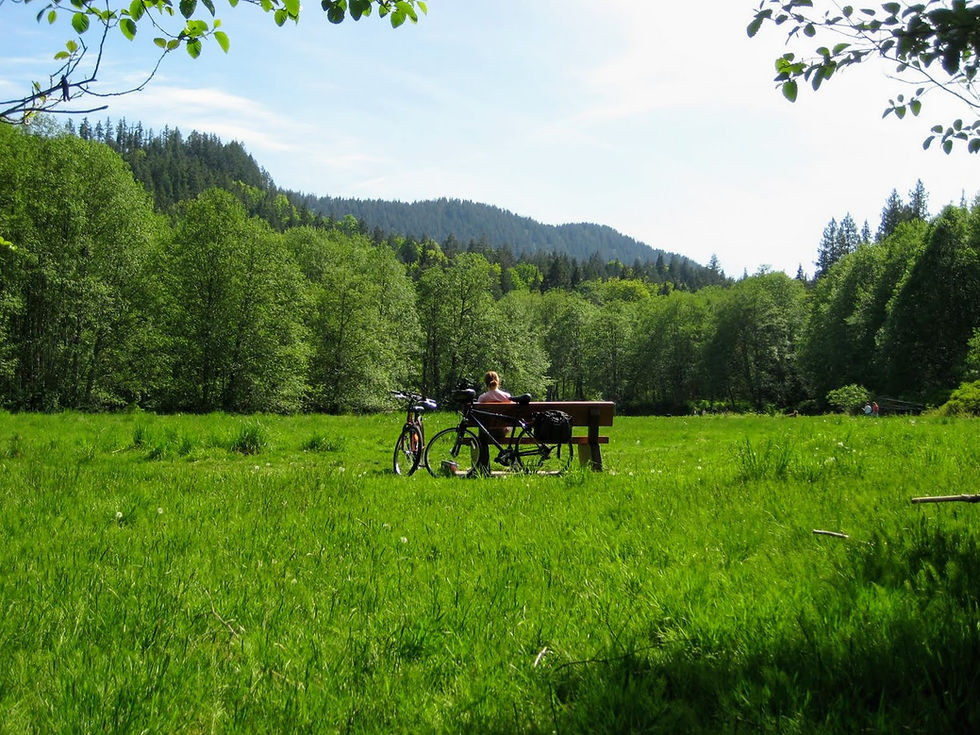10 year retrospective as a carless family
- Lacey

- Apr 22, 2022
- 4 min read
This Earth Day, we are celebrating our 10th anniversary as car-sharers.

As we mentioned 5 years ago, we gave up owning a car in 2012 as an experiment to see if we would save money, reduce our carbon footprint, and would be more or less inconvenienced.
Quick recap versus owning a car:
Our emissions decreased significantly
We saved a lot of money
Is it convenient? Yes (no car maintenance, cleaning etc.) and no (with kids especially)
What about years 5-10? Well, we've definitely been driving more lately:

We're showing the distance here, but the cost looks very similar. On average, we pay $1/km for car-sharing, which works out to about $2,200 per year.
According to NRCan, the average Canadian household spends $12,737 a year on transportation. Even when we factor in bike and transit costs, we're still saving money.
Modo
Apart from 2019, Modo continues to be our choice for not only the majority of our trips, but also for our longer trips. Modo holds our car-share record of 849 km travelled and we average 100 km per month. We use Modo the most when our kids aren’t in school (Spring Break and Summer Vacation) for road trips: camping, visiting nearby islands, etc.
The flexibility of Modo's diverse fleet is also hugely helpful. Here's a quick run-down of the vehicles we've used:
Prius (regular go-to)
pickup truck (recycling trip)
mini-van (trip with grandparents or friends)
cube van (moving ourselves or even friends)
car2go
The car2go carshare disappeared from Vancouver (indeed, all of North America) in early 2020. However, before it left, car2go offered an interesting deal — take one of their SUV models for a weekend trip. As you can see in 2019, we did indeed try that out. We drove 600 km to the interior of BC.
We probably saved a few dollars, but the experience was pretty bad:
The controls felt backward in every way (wipers on the left, etc.)
The fuel efficiency was below our standards
A "security feature" kept locking the doors, but our phone carrier didn't have reception so David would have to find wifi somewhere just to unlock the car
It was our first and last time taking a car2go out of the city.
Evo
With the disappearance of car2go, Evo filled the gap. Evo has the same one-way trip flexibility as car2go. It is our in-city workhorse, often used to take Grammy home after a visit or for rainy day adventures. We average about 7 trips and 50 km per month.
Our experience has been that the vehicles are often less than cleanly, at least compared to Modo. The backseat, in particular, which is where our biggest complainers sit.
How do we decide which car-share to use?
First, will it be a round-trip? If so, Modo is usually more available in our area — it often ends up being less expensive, too. For one-way trips, Evo may end up costing less but sometimes there just isn't one nearby. David built an app to help us quickly compare the costs of a given trip.
A few more considerations:
Evo cars come with a bike rack (but not large enough for all 4 of our bikes)
Modo is a co-op, so it feels like money well spent
Evo cars tend to be more fuel-efficient (always hybrid)
Convenience
The main challenge with carsharing is convenience. We're ok with some friction because it motivates us to be more active and stay local. But kids and their car-seat requirements definitely make it more difficult.
We also discovered that our kids get car sick in the past 5 years. This makes driving long distances challenging. We mostly now avoid these trips if we can.
Overall, it feels like we've made it through the most difficult family stage for carsharing. Both kids have graduated into booster seats, and the compact Mi-fold was a game-changer. It's so small, it can literally be thrown in a bag just in case we need to drive a vehicle later in the day (think walk+transit one way, kids get tired, Evo home).
Unfortunately, we still can't conveniently transport our bikes to a ferry or further destination for trips like a car-free island weekend. It sure would be nice if Modo had larger bike racks!
Summary
We’ve been quite happy to stay as a car-sharing family.
We’ve most appreciated avoiding the time sink of maintenance (e.g. oil changes, tire changes, ICBC renewal, etc.) and the mental energy that goes into owning a vehicle (e.g. where can I go to get the cheapest gas, where can I park). But, we also care deeply about our kids’ physical and mental health, our own health, our community and neighbours, and the health of our planet. Choosing to be carless for a decade has been an intentional choice and one that we don’t regret.
Do we regret our decision? No. Do we want to own a Tesla? No. Owning still comes with maintenance and insurance, both time-sinks (and money-sinks) in our opinion. We aren’t anti-car, just anti-car every day for every trip.
Are there things we still wish for car-sharing? Yes!
Cars with bike racks for 4 bikes, not just 2
Drop-off at the ferries so we can just walk or bike on
Phone chargers in all vehicles
More electric vehicles (we’re still waiting for the Tesla Model 3, but at least Modo has committed to a zero-emission fleet by 2030)
How do our kids feel about our decision not to own a vehicle?
Our kids are on board. They don’t enjoy driving (they get car-sick easily) and carsharing definitely motivates us to drive less overall. Funnily enough, they both like watching TV at Grammy’s house so that they can see car commercials... go figure!


Comments